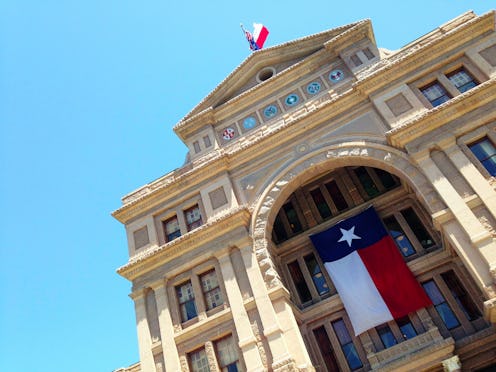Books
Texas Just Made A Surprise Decision On Textbooks

Textbooks are always a bit of a tricky issue, especially when it comes to how they might frame potentially controversial topics in subjects such as science or history. And to prove just how complicated the issue can be, recently a Texas policymaker's proposal to have experts fact check textbooks was shot down. Which is surprising, especially since most people should at least be able to agree that textbooks should be accurate, regardless of how they frame a particular topic.
The proposed change to the Texas Board of Education's vetting process for textbooks came from Republican board member Thomas Ratliff. Under his proposal, academics would review textbooks only for factual errors, but the board was still unwilling to change the process. The proposal was defeated by a vote of 7 to 8. However, the board did approve another change to the vetting process: Textbooks will now be reviewed by a panel where "at least a majority" of members must have "sufficient content expertise and experience." It isn't quite the same as fact-checking, but it is better than nothing, I suppose.
The board's decision comes not long after a controversy over a textbook used in Texas schools that described slaves as "workers" and generally framed the Atlantic slave trade as some sort of voluntary immigration system. The publisher, McGraw-Hill, has since apologized and begun changing its textbooks to more accurately reflect slavery. However, at least one Texas Board of Education member, Republican David Bradley, doesn't see why everyone seemed to find it such a big deal, saying of the incident that people are "too easily offended." Bradley was among the board members who questioned the need for fact checking.
The controversies over textbooks in Texas don't just affect Texan school children, either. Texas is the second most populous state in the country, which means its Board of Education decisions about which textbooks are approved for school purchase not only affect the education of millions of school children in the state, but also influence textbook publishers. After all, publishing companies don't want to lose out on the huge market for textbooks in Texas, which makes them unlikely to put out a textbook they know the Texas Board of Education wouldn't approve of. And because many groups in Texas often push for more conservative curricula — with, it seems, a great deal of success — that can have an impact on American education as a whole.
On the flip side, if Texas adopted a policy of fact-checking all their textbooks, that might in turn make textbooks more accurate for all Americans as publishers respond to the increased pressure with more rigorous fact-checking of their own.
For now, though, it seems that Texas textbooks will not be fact checked by experts. Alas.
Image: Texas State Library and Archives Commission/Flickr